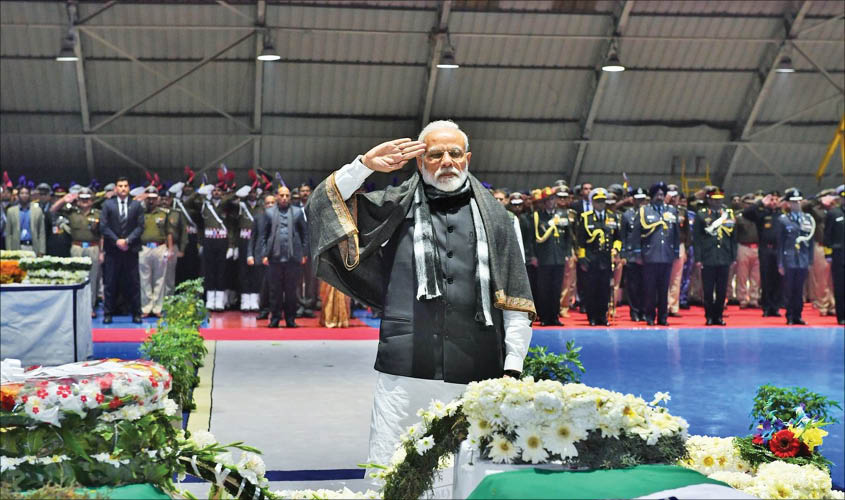What could pose a major challenge to the government is to somehow prevent any further Pulwama type attacks in Kashmir or in other parts of the country.
New Delhi: By extending categorical support to the government on the specific issue of combating terrorism, the Opposition has put the ball back in Prime Minister Narendra Modi’s court, for determining an appropriate response to the attack on a CRPF convoy in Pulwama on Thursday, resulting in the gory death of over 40 security personnel. Modi had earlier stated that he had authorised the armed forces to give a befitting and jaw-breaking reply to those responsible for carrying out the dastardly assault, the worst in Jammu and Kashmir.
The gruesome incident, totally avoidable, has thrown up several grave questions regarding the preparedness of the security forces and the absence of real time intelligence. However, by choosing to back the government, the Opposition has displayed political maturity, sending out a strong message to the international community that India is one when it comes to combating terrorism. This act of the Opposition also ensured that in election season, jingoistic groups associated with the Sangh Parivar could not give a political colour to any critical statement expressing anguish over the state policy on Kashmir.
What in the immediate future could pose a major challenge to the government is to somehow prevent any further Pulwama type attacks in Kashmir, or in other parts of the country, while simultaneously devising an effective and implementable strategy to counter threats from across the border. Sources said that security agencies were in the process of figuring out what happened in Pulwama, and are yet to establish an irrefutable link to terror outfits of Pakistan, though Jaish-e-Mohammed has claimed responsibility for the crime.
Investigations are on to ascertain whether Adil Ahmad Dar, the suicide bomber, was a lone wolf or was assisted by a group of people whose identities remain unknown. Media reports suggesting that 300 kilograms of explosives or less were used to carry out the assault could be misleading, since so far there is no basis of this assumption. The investigators remain unclear on what kind of explosives, were used. Supposing they were plastic explosives, then which country’s signature was found on the remnants? Every plastic explosive can lead to the country of its origin due to the fact that it has a specific mark, which is readily recognisable by experts.
If Dar, indeed, was the sole person who carried out this act, how did he procure these explosives? And what were the intelligence agencies doing, since Dar who exhibited the proclivity of joining a terror outfit, would occasionally visit his family at their village home? Why was he never subjected to any questioning regarding his activities?
This gruesome tragedy of unthinkable proportions has shaken the conscience of the country to the core, while at the same time bringing to fore the inadequacies of our preparedness. For instance, senior intelligence officials admit that despite spending crores of rupees on a daily basis, there was virtually no “human intelligence” available in the turbulent parts of the state. On the condition of anonymity, a senior intelligence official said, “The entire intelligence operations that are conducted are on radio signals or intercepts with non-existent human intelligence.”
The training of the CRPF and other paramilitary organisations has also come under close scrutiny, given how such a large convoy was permitted to travel on a partially sanitised route, thus making the jawans sitting ducks. The casual approach of senior officers has pointed to gaping loopholes in the system.
The dilemma now before the government is how to cope with a development that has a full blown potential of striking an emotional chord throughout the length and breadth of the country. After the attack on Uri, surgical strikes were carried out. However, this time round, Pakistan and its forces would be fully prepared to counter any such strike, which would lead to heavy casualties on both sides.
At this stage, is the Prime Minister, or his government, equipped for a full-scale war with Pakistan, fully aware that the neighbouring country is a “rogue state”, which would not refrain from carrying out nuclear options available to it? Islamabad is riding high, especially after the Afghan talks have been initiated, and the United States would once again require Pakistan to be an able ally. Any kind of international backing for India would arrive only once it is able to provide concrete and well-documented forensic evidence connecting Pakistan to this particular attack, given that the alleged perpetrator was a home-grown terrorist.
It would be total naivety to assume that after a lapse of time, politics over the issue would not be unleashed. Opposition groups in the state have been accusing the Bharatiya Janata Party (BJP) of muddying the waters by its ham-handed approach in dealing with issues.
The BJP on its part too would, in the future, attempt to use the incident for the furtherance of its divisive politics.
In this hour of crisis, it is for the Prime Minister to rise above political considerations and lead the country forward. He has the capacity to spearhead from the front and therefore must ensure that the nature of retaliation is determined by the civilian establishment, which would provide pertinent and befitting directions to our armed forces and security personnel.

